by Alex Dueben
Thrash will be a guest at the Texas Book Festival this weekend. She recently spoke with The Beat about why she made a memoir, the way the conversation about LGBTQ issues has changed in a short time, and what the comics medium means to her.
Alex Dueben: Where did the idea for Honor Girl start for you?
Maggie Thrash: I get asked that question a lot, and every time I get asked I go into panic mode. Why did I do this? The answer is that this is probably the most formative moment of my young life. I was one person, and by the end of the summer I was a different person. Change can happen so rapidly when you’re a teenager. I can trace so much of who I am today back to these events. For selfish reasons, I wanted to process it and talk about it because I’ve been holding it inside for a really long time.
I also think it’s really interesting to go back and remember what it was like at the turn of the millennium for LGBT issues. It was a bizarre nebulous time. ‘Don’t ask, don’t tell’ was really passive aggressive. It was a strange time to be queer and I wanted to explore that. I’d only written fiction before, so this is my first foray into memoir.
Dueben: Had you been drawing and making art and comics before this?
Thrash: Not really. I’d written lots of fiction and really enjoyed it, but I found the process of writing nonfiction about myself to be arduous and terrible and ineffectual and just awful. I was not good at writing about myself and having to explain my thoughts. It wasn’t working. My roommate said, you should probably make this into a comic, it would work much better as a comic. I made a webcomic which is still on the internet. You can find it through my website and you can see how much my artwork has changed since I started that three years ago.
I’m quite new to all of this, I have no art background. It’s important for me to tell people that. You can go write a graphic novel. You don’t have to go to art school. Just read them and study them and you can do it. I don’t say that to devalue the medium and how much hard work goes into it.
Dueben: Were you a big comics reader?
Thrash: Not really. [laughs] I don’t want to inspire the ire of the comics community. My brother is really into comics and growing up I was really into Betty and Veronica and Garfield and all the classic stuff. I loved Scott Pilgrim. Scott Pilgrim was a book where I thought, I think I could do this. It was so personal and fun. I really didn’t have that much experience reading comics either.
Now, of course I’m having this intellectual revolution where I’m obsessed with comics. I’m obsessed with them as a mode of storytelling. I’m studying them all the time. I just read Super Mutant Magic Academy and I love it so much.
Dueben: You said that you initially tried to write the book as prose, but why a graphic novel?
Thrash: If I wanted to tell this story, it had to be a comic. For me, it’s the best way for me to talk about myself and present myself. It’s a way for me to be really personal and vulnerable. I’m able to access this vulnerable side of myself in comics that I can’t in any other mode of my life. It was the only way that I could tell this story. I could have made a webcomic but I thought it would work better as a book. I like that people can sit down and read this in one sitting because that’s how that summer felt. Just that everything was happening at once and I didn’t have time process it.
Dueben: I’m sure that summer felt like this blink of an eye rush of events.
Thrash: Exactly. I like that people can just sit down and read it. Comics are the best way to be objective about yourself. I’d always thought of objectivity as this very right brain rational thing, but actually, to be objective about yourself is to make yourself super-vulnerable. I think the best way to see yourself clearly and see how events shaped you is to translate them into comics. I would recommend anyone going through anything to write a comic about it, you’ll see yourself so much more clearly.
Dueben: By drawing yourself, you had some distance from yourself instead of being in your head the whole time.
Thrash: Exactly. Prose would have just felt like this total quagmire and with comics I can just zoom out of my head and really see the bigger picture, and it feels more honest.
Dueben: There were so many things at Camp Bellflower that are interesting, but the one that made me go, oh my god, is the fact that the camp is only accessible by barge. In the 21st Century that feels like a lawsuit waiting to happen.
Thrash: [laughs] Yeah, it’s incredible. They get their food on a truck that comes on the barge. The barge only comes across several times a day. It seems incredible that there’s still this little Brigadoon of a place in America where it’s girls only and can only be accessed by barge.
Dueben: The daily Civil War reenactments are interesting, to say the least.
Thrash: That’s something I find sort of charming when I look back. At the time I hated it. I hated having to scream at other girls for twenty minutes every morning with this bizarre detached aggression that’s obviously still left over from having lost the Civil War. [laughs] This hint that everyone’s still feeling this pain in the South.
Dueben: It’s better than some of the other ways aggression and pain at losing are expressed, but you just screamed “blue” and “gray” at each other for twenty minutes every morning?
Thrash: Exactly. It was completely random which girls were the blues and which were the grays. It was completely random and you were gray for your whole tenure at camp. I was gray for all eight years. It was randomly decided the day I got there as a 9-year-old.
Dueben: It’s been years since these events happened, but as you were making the book, did you understand what it meant? You described this as the key event of your life, did you come to learn that by making the book?
Thrash: Absolutely. Through making the book it became so clear how much that summer had shaped me. It was this watershed moment in how I was going to deal with things in the future. This was the first major emotional crisis in my life and the way it shaped me has created tendencies that will stay with me probably forever. [laughs]
I mean, I do believe people can change. Well, sometimes I believe that. Even though the book is being quite well received and it’s felt very liberating and freeing to have this story out there, I still feel this intense wariness and suspiciousness that some day the heteronormative police state is going to come for me. [laughs]
Dueben: Along those lines, I’m sure a lot of people can relate to this teenage emotional crisis in a lot of ways, but this is also the story of your first crush–which was reciprocated. That’s not how it works for most of us and I imagine that must have shaped you as well.
Thrash: I struggled with that because I had a decent amount of self esteem as a teen, but it was still so hard to accept and believe that this exquisitely cool nineteen-year-old girl could like me the way that I liked her. The fact that it was suddenly apparent that I liked girls wasn’t as incredible to process as the fact that this girl could like me back. I think I held myself back a lot that summer because I didn’t quite believe. I just wasn’t ready to believe. I still have this level of disbelief and triumph.
Dueben: Also it is an emotional crisis, but your friends don’t freak out at all. They’re really supportive and encouraging.
Thrash: Yeah, the enforcers of this queer invisibility were mostly older people, which I think comes across. My two best friends are pretty supportive. It’s not a story about peers stabbing each other in the back. It’s about older people crushing your spirit. [laughs]
Dueben: Did you talk with Erin or your parents about making the book?
Thrash: No. I purposely did not tell anyone. My mom kept asking me, what’s so interesting about camp that anyone is going to want to read a book about it? I was very evasive: you know, friendship, athletic rivalry, whatever. I was very withholding. I didn’t talk to anyone from camp. Partly because I was terrified to and partly because it was really important to just stay in my own mindset and remember how things felt when I was fifteen and not really put myself in the position of being beholden to the experiences of the people around me. I wanted it to stay subjective and deep in my own experience.
I had to talk to Erin because “Untouchable Angel,” the song in the book, is a real song. I had to get her legal permission to use the song lyrics. [laughs] That was my first contact with her in twelve years. She was like, I guess, sure.
Dueben: Have Erin and your mother read the book and commented on it?
Thrash: Yes. They have read the book and they’ve both been very supportive. Especially my mom who’s really stepped up. I never discussed any of this stuff with my mom before. She voraciously reads all my reviews. [laughs] They both read it and it’s been very healing–not to be horribly corny–but it really has.
Dueben: How did you end up writing for Rookie?
Thrash: That was me basically banging on their door until they let me in. [laughs] That’s another thing I would tell people, you don’t need to be discovered, you don’t need to be “special,” just find where you want to be and make them accept you. [laughs] That’s basically how I got into Rookie. When that site went up I thought, this is going to be the coolest place on the internet now, I have to be there. I submitted a bunch of stuff and wouldn’t let them forget me. I was super aggressive.
Dueben: Has writing for Rookie and that sensibility been an influence as you were working on Honor Girl?
Thrash: Absolutely. In a way I don’t think I could have written it without Rookie because the collective universal team mind at Rookie was my muse. I would have just been like paralyzed by self-consciousness if I’d been writing it for myself or for my mom or, god forbid, for Erin. I basically wrote it for Rookie. They were my faceless muses.
Dueben: I know that you signed a deal to write a novel. Why a novel and not another comic?
Thrash: Comics are incredibly hard. They’re incredibly hard and I needed a break and I want to just flex my muscles with prose for a while and then go back to comics. My ideal career trajectory would be to switch back and forth. Write a novel and then another graphic novel and then a novel. They bring out different things in me and I think they provide different challenges and different creative opportunities. I love both so I couldn’t choose one.
Dueben: Do you plan to write another memoir?
Thrash: Yes. I hope so. I hope to do a follow up to Honor Girl at some point in the future. I might do one about home, about Atlanta, and the home that I returned to after this idyllic bubble of a summer. I don’t know, but Honor Girl was so exciting and satisfying to write I know I want to do something like that again. But I need a break from myself. [laughs] Fiction provides that.
Dueben: Now you want to get into someone’s head.
Thrash: Yes. I want to get into someone else’s head. [laughs]
Dueben: Will your next memoir be a comic?
Thrash: Oh yeah. Writing a memoir for me is one hundred per cent tied to comics. That’s my way of talking about myself and expressing myself personally. That’s how I do it. If we conducted this interview in comics I could probably express myself better. [laughs] Memoir and comics to me are intrinsically handcuffed together.
It was from Honor Girl but also from my webcomic, Loner Comics. Just realizing how much easier it was to talk about myself if I drew myself. In my mind there’s this divide, words are for fiction and comics are for being personal and first person.
Dueben: That’s interesting. I don’t know of many artists who think in that way. I know Ariel Schrag is a novelist and writes for television but her comics are autobiographical and she seems to have a similar way of thinking.
Thrash: That’s true. She does have the same divide. I wonder what calls a certain mind to do that? To use art and comics to talk about the self and prose to talk about things that you make up?
Dueben: Are you doing a lot of events for the book?
Thrash: I’m going to some bookstores around the Northeast. I’m going to the Texas Book Fest. This book took me two and a half years so I’m very excited to meet readers and just interact with people. I’m an extrovert. I feel like a lot of writers get depleted and daunted by the idea of doing tours because they’re introverts, but I’m chomping at the bit.
If you’re around Austin this weekend, you can say hello to Maggie at the Texas Book Festival! Check out her website here.
Cover photo by Nico Carver.
HONOR GIRL. Copyright © 2015 by Maggie Thrash. Reproduced by permission of the publisher, Candlewick Press, Somerville, MA.



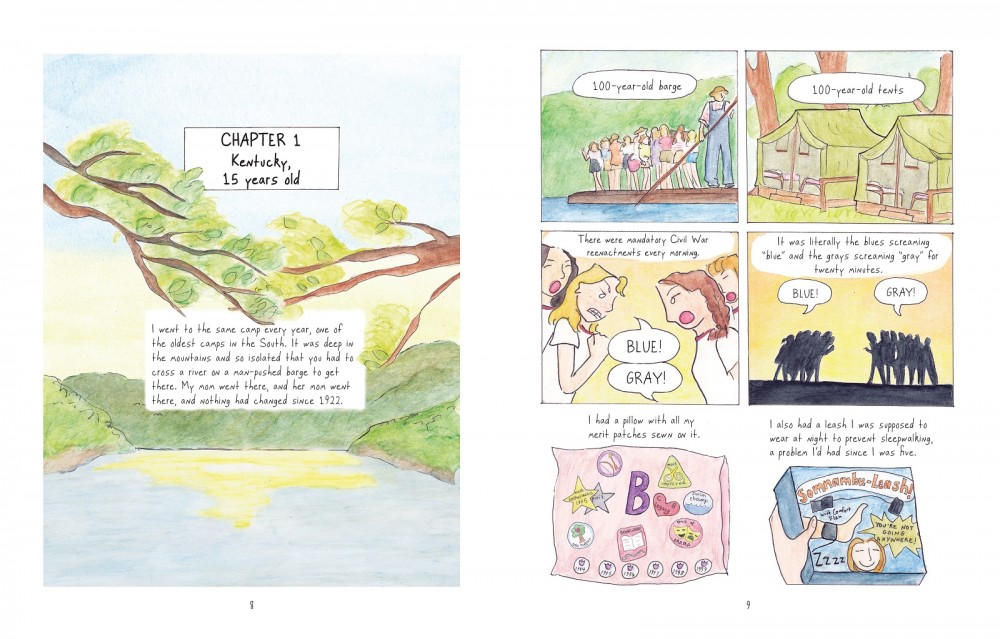
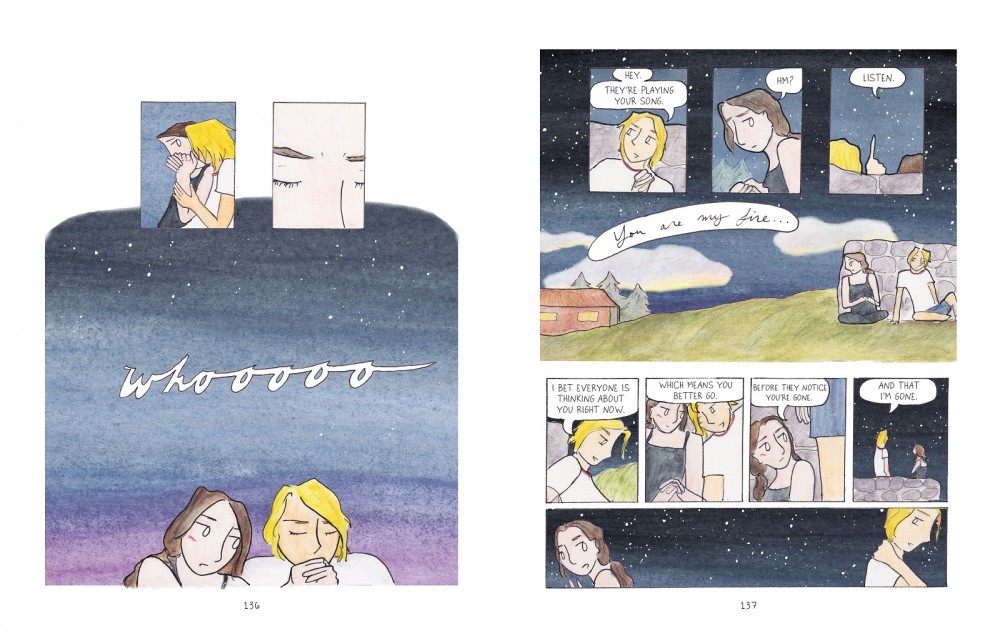
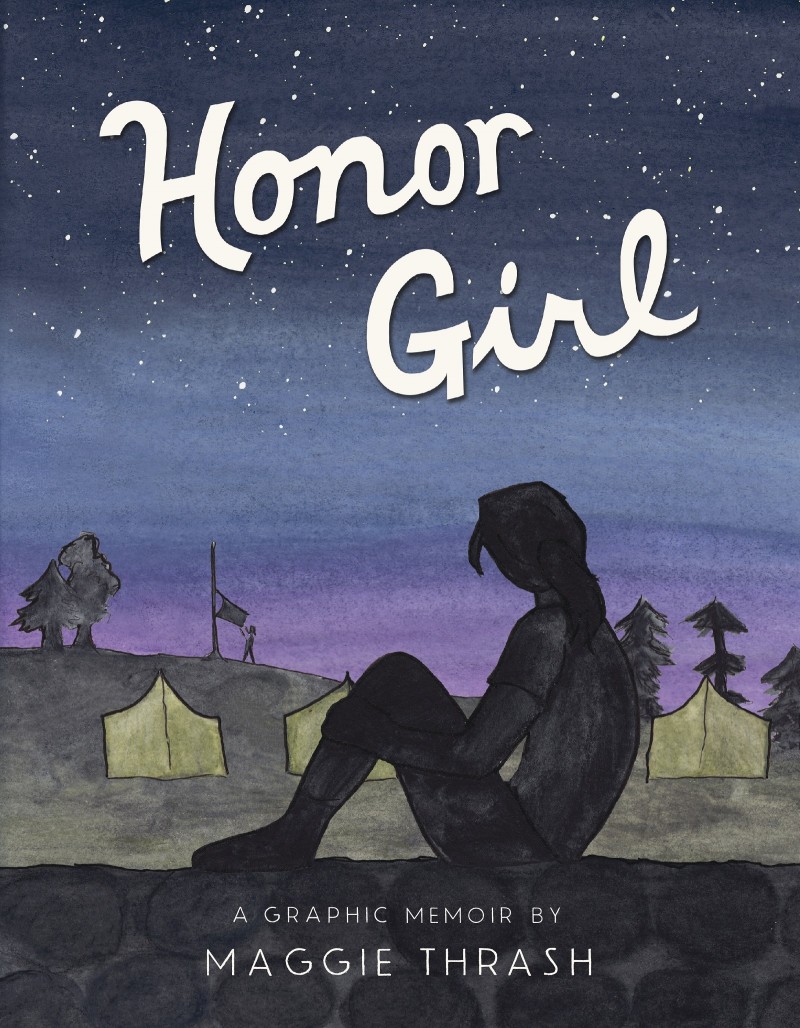
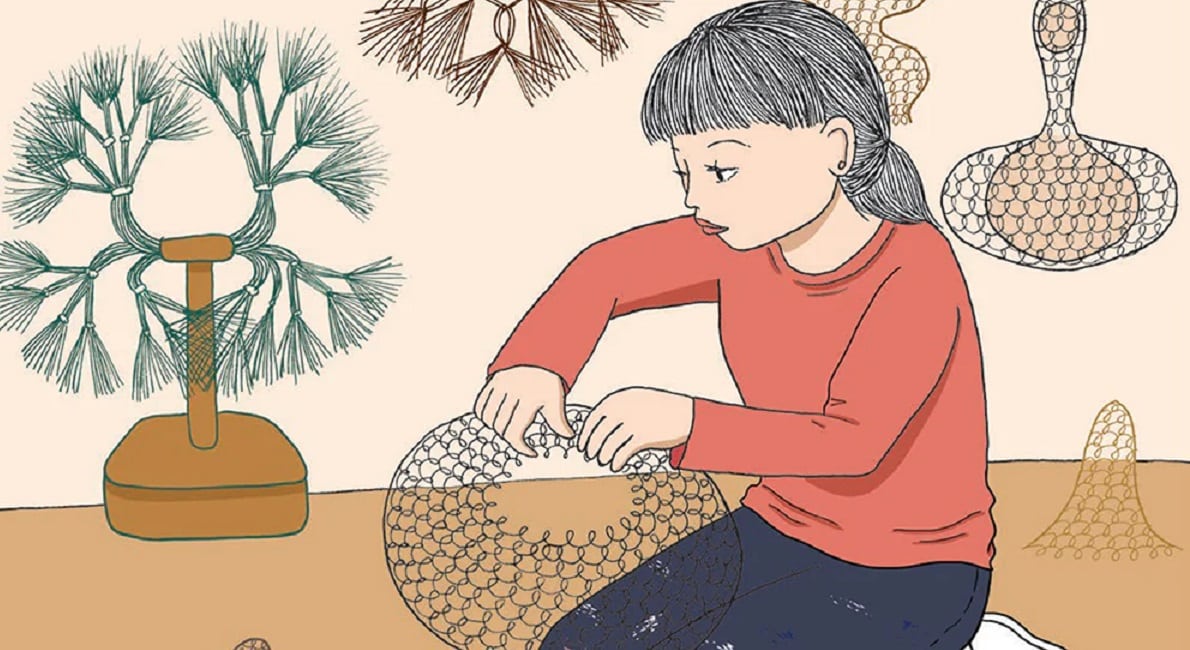
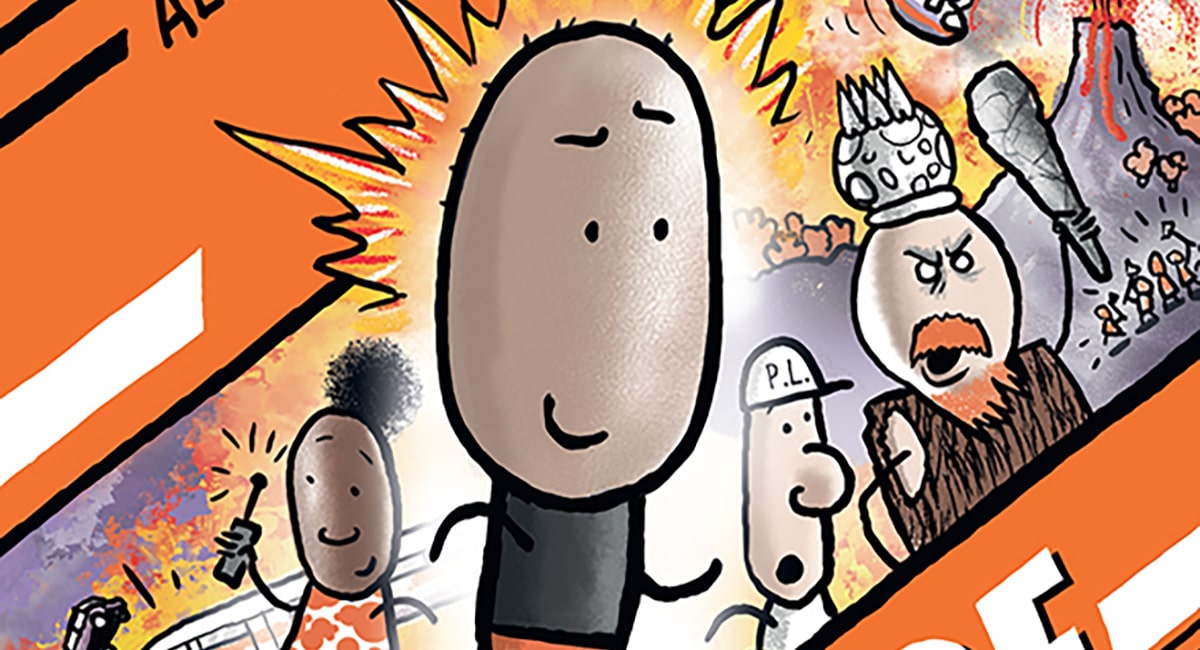
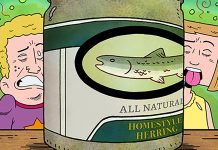


I loved Honor Girl! Thanks for sharing your story, Maggie!
Comments are closed.